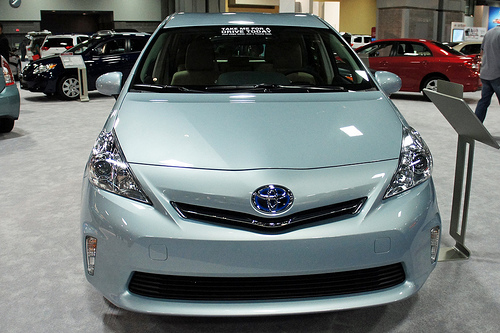|
Gasoline prices rose every day from July 9-18, AAA reports. Some point to the political turmoil in Egypt and Syria as the cause, while others pin the blame on the monetary policies of the Federal Reserve. Mintel, a market research firm in London, found that hybrid and electric vehicle (EVs) sales in the United States grew by 73 percent from 2011 to 2012, mostly as a result of the increasing costs of fuel. But hybrids and EVs are more expensive than their full-gasoline counterparts, putting them out of reach for many Americans. But for as little as $1,000, you can turn any diesel-powered vehicle into one powered by vegetable oil. And as crazy and unconventional as this idea may sound, it really is not that difficult to do, if you are committed to freeing yourself from the prison known as fossil fuels. Buy Your KitThis will be the most expensive part of the process, but it will pay for itself in a matter of months. OrganicMechanic.com and Greasecar.com both sell conversion kits specific to your type of vehicle. People with a boating license in Alabama and other states with water access can even consider converting their boat for vegetable oil power as well. The kit will have every part you need, including a heated bio-fuel tank, vacuum gauges, an SVO controller (to switch between gasoline and vegetable oil power) and of course, instructions on how to install everything. Installation is somewhat of a specialized skill, so you may need to do some extra work to find a mechanic if you don’t have the tools and mechanical wherewithal to do the job yourself. Get Your Vegetable Oil FuelA gallon of vegetable oil at a grocery store costs around $8, more than double the price of a gallon of gas. The oil used to power a vehicle does not have to be brand new. The key to the entire idea is to get your fuel from restaurants, schools and other businesses that would otherwise throw it away. These places usually pay someone to come haul away their used oil after a few days of cooking french fries, chicken strips and other artery-clogging delicacies in it. You can become a few businesses de-facto garbage person and turn their trash into your fuel. Make certain the oil is nonhydrogenated (like canola), as cream-based oils will cause clogs in fuel injectors and filters. Paul Powers, who runs his Chevy 4500 Kodiak on vegetable oil, told Diesel Power Magazine that he prefers waste oil from Asian restaurants as opposed to fast food restaurants because its generally cleaner and higher quality. FilteringWaste oil is not immediately ready to be used. It will need to be heated, liquefied and filtered. All the food crumbs, water and other contaminates will need to be removed to avoid damaging your engine. There is no cut-and-dried method of doing this, but the basic idea is to pump the oil from the contaminated supply to a new barrel that collects the clean, ready-to-use fuel. Converting your vehicle will not only save you money in the long run, but will help lower your carbon footprint and free you from gas-price watching. It also reduces landfill waste and provides an instant conversation starter with just about anyone.
0 Comments
Hybrids are hot right now, having dramatically increased their share of the overall vehicle market in the past several years. The Toyota Prius is in particularly high demand, displaying an impressive sales increase of 9.5 percent between May, 2012 and May, 2013, for a total annual volume of more than 23,000 vehicles. While drivers are buying hybrids for various reasons, given the combination of an economic slump and high gas prices, affordability is often listed as a deciding factor.
But are these fuel efficient vehicles actually more affordable than their standard counterparts? Ownership Costs For Standard VehiclesA basic understanding of ownership costs of standard vehicles can help you better understand the implications of buying a hybrid. Typically, the upfront cost is greater for a hybrid, with some or all of the difference being made up through the hybrid's fuel efficiency. The American Automobile Association (AAA) listed the annual cost of owning and operating a mid-sized sedan at $9,122 a year, or 60 cents per mile. This figure assumes that the driver owns the sedan for a minimum of five years and racks up an estimated annual mileage of 15,000. Costs included in AAA's estimate include fuel, maintenance and insurance, all of which have the potential to be impacted by the hybrid label. Ownership Costs For Hybrid VehiclesThe easiest way to compare long-term hybrid vehicle costs is to simply compare the hybrid version of a given vehicle to the original model. Edmunds lists the five year cost of owning a Honda Civic at $35,188. Compare this to the Civic Hybrid, which offered a slightly lower cost of ownership at $34,237. Thus, the conclusion is that, over a five year period, it is less expensive to own and operate a Civic Hybrid. The economic benefits of hybrid ownership are also exemplified by a cost comparison of the Ford Fusion Sedan to the Ford Fusion Hybrid. During the course of five years, the standard Fusion costs $39,698 to operate, while the hybrid totals $34,465. Either Fusion is an affordable option, with www.drivetime.com listing the vehicle at just $18,965. Let's Not Forget As with AAA's ownership cost estimate, Edmunds' calculations include fuel, repairs and auto insurance expenses. Most of the savings of a hybrid come from spending less time at the gas pump. Maintenance costs for the hybrid are slightly more expensive, simply because the battery pack will need to be replaced. However, this cost may be offset by federal and state tax breaks for hybrid owners. Ultimately, a hybrid becomes more affordable the more it is used. Thus, if you do not anticipate driving your car over 10,000 miles per year, the hybrid may not yet serve as the more economical vehicle option. But for frequent drivers, the long-term reduction in gas prices is enough of offset the upfront cost, ultimately making a hybrid model the more affordable option. Creative Commons image by mariordo59 |



 RSS Feed
RSS Feed
